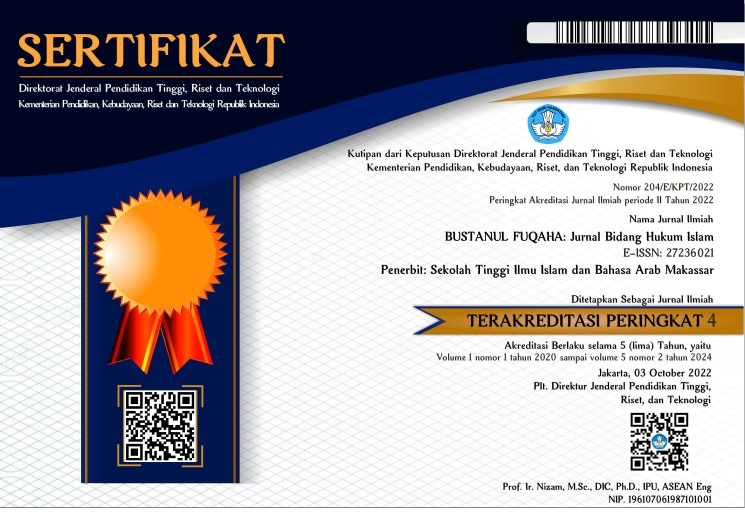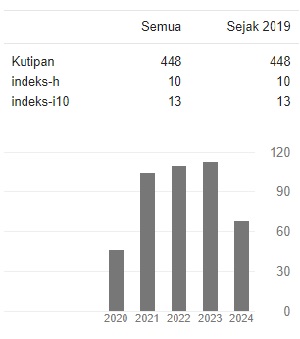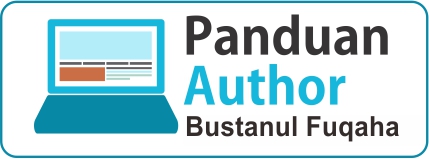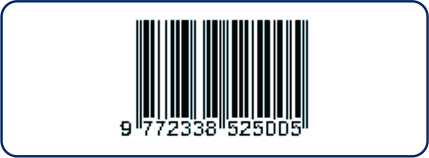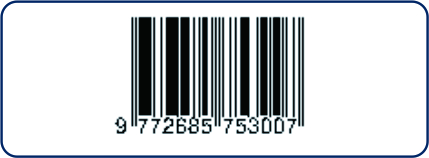Tata Cara Bersuci dan Salat bagi Tenaga Kesehatan (Nakes) yang Menggunakan Alat Pelindung Diri (APD)
DOI:
https://doi.org/10.36701/bustanul.v1i2.148Keywords:
Procedure, purification , prayer, health workers, PPEAbstract
This study aimed to elaborate and examine the procedures for purification and prayer for health workers when using personal protective equipment (PPE). This research used a descriptive qualitative approach through content analysis techniques and library research. The results show that: First, it is an emergency condition that PPE is not applied, it will threaten the safety of his or her life in which he or she is vulnerable to infected with the virus; Secondly, before using PPE, health workers should have themselves purified from small hadas (impurity) through ablution or from the big one through bathing; Third, in the state of purity and nothing breaks the ablution, health workers can immediately pray as usual; Fourth, if their ablution is broken and they still must wear PPE while it is feared that time for prayer be over, then they should pray according to their circumstances even though they are obstructed from purification; Fifth, under certain situation, due to the job, health workers cannot perform prayers on time or cannot merge their prayers then they should immediately perform prayers whenever it is possible.
Downloads
References
Al-Qur’an.
Al-Bukhari, Muhammad bin Ismail. (1424 H). Shahih Bukhari. Cet. I; Beirut: Dar Al-Kutub Al-Ilmiyah
Al-Hajjawi, Musa bin Ahmad. Al-Iqna. Beirut: Dar Al-Marifah, jilid 1. h. 54.
Al-Naisaburi, Muslim bin Hajjaj. (1421 H). Shahih Muslim. Cetakan kedua, Riyadh, Darus Salam.
Al-Nawawi, Yahya bin Syaraf. (1392 H). Al-Minhaj Syarah Shahih Muslim bin Al-Hajjaj. Cet. II; Beirut: Dar Ihya Al-Turats, jilid 15, h. 83.
Al-Sa’di, Abdurrahman bin Nashir. (2000). Taisir Al-Karim Al-Rahman Fi Tafsir Kalam Al-Mannan. Cet. 1; Riyadh: Muassaah Al-Risalah, h.868.
Ibnu Katsir, Ismail bin Umar. (1419 H). Tafsir Al-Quran Al-Adzim. Cet. I; Beirut: Dar Al-Kutub Al-Ilmiyah, jilid 5, h. 398.
Ibnu Taimiyah, Ahmad bin Abdul Halim bin Abdus Salam. (1408 H). Al-Fatawa Al-Kubra. Cet. I; Dar Al-Kutub Al-Ilmiyah, jilid 5, h. 309.
Ibnu Qudamah, Abdullah bin Ahmad bin Muhammad. (1388 H). Al-Mughni. Maktabah Al-Qahirah, jilid 1. h. 184.
Iskandar, A., Aqbar, K. (2019). Kedudukan Ilmu Ekonomi Islam di Antara Ilmu Ekonomi dan Fikih Muamalah: Analisis Problematika Epistemologis. Nukhbatul ‘Ulum: Jurnal Bidang Kajian Islam, Vol. 5, No. 2 (2019), h. 88-105.




